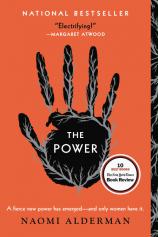The Power
Review
The Power
If you haven’t read it, you’ve probably seen it: Margaret Atwood’s THE HANDMAID’S TALE, published in 1985 but made newly famous by the Hulu miniseries. It’s likely the best-known dystopia in recent history, and I mention it because Atwood’s monumental presence hangs over this book. Not that Naomi Alderman is a nobody. Her debut novel, DISOBEDIENCE, got the Orange Award for New Writers in 2006, and THE POWER, her latest (first published in the UK), won the 2017 Baileys Women’s Prize for Fiction. But Atwood is clearly a friend and mentor (the book is dedicated to her and her husband), and as for the theme --- well, call it the anti-HANDMAID’S TALE.
The women in THE HANDMAID’S TALE become, essentially, sex slaves and baby receptacles, while in Alderman’s book, they dominate the world --- physically. Sometime in the distant past, a new organ of the body, the skein, shows up in teenage girls and enables them to generate electric shocks that can maim, manipulate and kill. Soon this capability spreads to older women, abruptly shifting the balance of gender power and the nature of reality itself.
Alderman frames her novel with a satirical device. We are now in a future where women have been in charge for thousands of years, and one Neil Adam Armon, a member of The Men Writers Association (male novelists being so rare and unexpected a breed that they have to be labeled as such), is showing an historical novel to his mentor, an eminent author by the name of “Naomi Alderman.” Neil’s manuscript, The Power, purports to trace the origins of the matriarchy, positing an earlier age in which men were the ruling gender.
"THE POWER is often disturbing, sometimes exhilarating and, above all, a healthy reminder --- particularly apt in the age of Trump, Cosby and Weinstein --- that even if women do not experience male violence in an immediate physical sense, the implied threat is always with us."
The narrative alternates among four main characters, all smart and ambitious, each showing different sides of the march toward a gender flip-flop. There is Allie, who kills her sexually abusive foster father, then escapes to a convent, where she hears voices, heals the sick, adopts the name Mother Eve, and founds a cult based on a feminist reinterpretation of the Bible. There is Tunde --- the only male character of any weight --- an attractive young Nigerian man who becomes the blogger/video chronicler of the female takeover. Margot is the mayor of an East Coast city whose power is activated by her adolescent daughter. She becomes governor, then senator, developing military training camps for girls and realizing that “the power to hurt is a kind of wealth” --- even if you don’t use it. Finally, Roxy, daughter of a London crime family, witnesses her mother murdered around the same time as her skein comes alive. She becomes an international mover and shaker in the trade of a power-enhancing drug, Glitter, until betrayal and mutilation force her back on her own unenhanced toughness.
The structure of THE POWER is in the form of a 10-year countdown --- but to what, at first the reader doesn’t know. The earliest stirrings of unrest are in countries where women have been most abused (Saudi Arabia, for one, and Moldova, a center of sex trafficking, for another), while in the West, media and government alike try to contain and normalize the situation. A sort of Greek chorus is provided by a TV news team, consisting first of Tom (lead anchor) and Kristen (eye candy), then evolving to Kristen (sober new face of the news) and Matt (sweet, decorative, earnest). As women organize, train and terrorize, they evoke an answering response among male extremists, until at last all four main characters converge in Eastern Europe. Women have broken away from Moldova to form the increasingly authoritarian female state of Bessaraba, culminating in...well, that would be telling.
Alderman is a skillful writer whose book bristles with intelligence and wit. Sometimes, though, I felt distanced from the characters by her ironic tone, especially when it’s clear from several poignant passages that she can do more. Here, for example, are Tunde’s notes for the book he plans: “At first we [men] did not speak our hurt because it was not manly. Now we do not speak it because we are afraid and ashamed and alone.... It is hard to know when the first became the second.” And here are Roxy and Tunde, their bodies “rewritten by suffering,” making love: “They move slowly and easily, taking account of each other’s particular pains, smiling and sleepy, and for a moment without fear. They come with soft, animal grunts, snuffling into each other’s necks, and fall asleep like that, legs intertwined…in the center of a war.”
The danger in any dystopian novel, I suppose, is that ideas will overwhelm character and plot. When Alderman returns in a coda to a further exchange of letters between Neil, the supposed author of The Power, and the future fictional version of herself, I found it unnecessarily didactic, if entertaining. Having read the manuscript, “Naomi” is by turns supportive and patronizing (she calls it “a fun exercise” in the reinterpretation of history). She can’t quite believe that Neil’s book is anything other than a heretical fairy tale. How could men, innately kind and nurturing, ever have been soldiers or rapists or pimps? How could the standard history of the world be nothing but a gigantic lie? The point, of course, is that history is fickle, amassing and legitimizing evidence that supports the winners, not the losers.
At the very end, “Naomi” suggests that her protegé consider publishing under a female name. Surely this is meant to remind us of the Brontë sisters, sending JANE EYRE, WUTHERING HEIGHTS and AGNES GREY to London publishers under male pseudonyms in the 1840s. It’s amusing, in a ghastly way.
THE POWER is often disturbing, sometimes exhilarating and, above all, a healthy reminder --- particularly apt in the age of Trump, Cosby and Weinstein --- that even if women do not experience male violence in an immediate physical sense, the implied threat is always with us. Often that is enough to keep us frightened, silent, intimidated, self-censoring and powerless.
Reviewed by Katherine B. Weissman on October 27, 2017
The Power
- Publication Date: January 8, 2019
- Genres: Dystopian, Fiction, Science Fiction
- Paperback: 400 pages
- Publisher: Back Bay Books
- ISBN-10: 0316547603
- ISBN-13: 9780316547604




